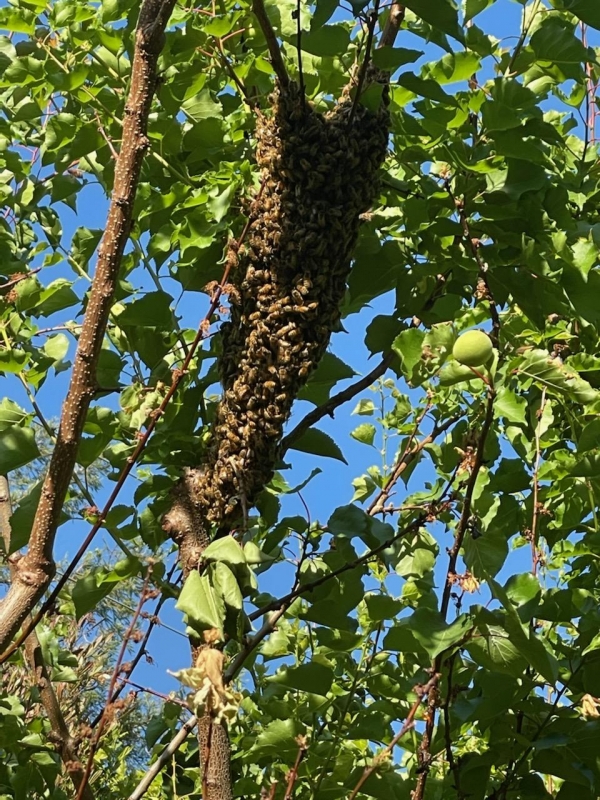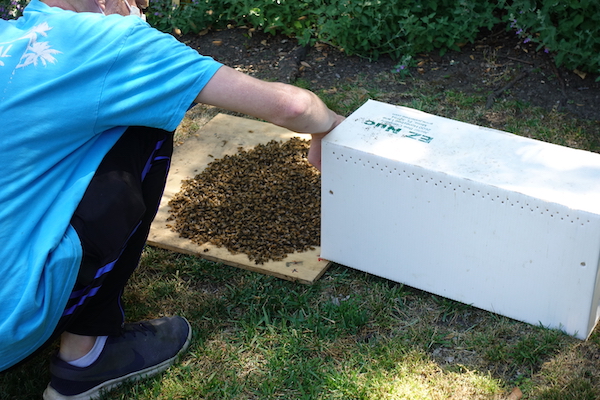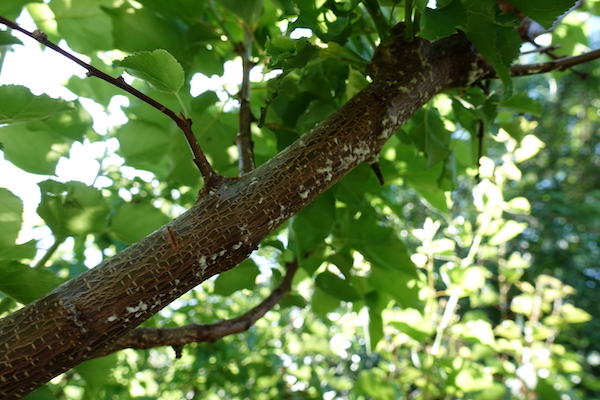It turns out there was a newly arrived swarm of honeybees in our apricot tree! A swarm is a group of bees that recently left an overcrowded hive and is in search of a new home. They are resting temporarily, often just for a day.

A honeybee swarm in our apricot tree Sunday evening
I remembered reading this Nextdoor post a few months ago, urging people to call a beekeeper if they see one of these, often in April and May in our area. The beekeeper can help the swarm to find a good home.
Joseph Borison came by this morning to take a look. It looked to me like a bunch of bees had flown away, but he said sometimes a swarm just compresses when it’s cooler.

The smaller honeybee swarm on Monday morning
The bees in our tree were European honeybees, Apis mellifera, “mellifera” means honey-bearing. They are fairly common here, though not native. This is a small swarm.

A close-up of the honeybee swarm
Joseph climbed up a ladder and shook the branch, holding a large board beneath the hive. He is not wearing any protection because bees in a swarm are generally docile. They don’t have much to protect since they are on their way to find a home (hive). And they are typically full of honey from leaving their previous hive, so they are pretty relaxed.

Going up to shake the swarm and catch the bees on the board
The disoriented bees fell onto a board he was holding, which he then placed on the ground.

Placing much of the swarm on the ground. Some remains clinging to the branch.
Joseph had brought with him a so-called “nuc box”, with some comb inside to help attract the bees and make them feel at home. He positioned it next to the board so that they would quickly find somewhere safe to go.

Placing the nuc box down by the board with the disoriented bees.
Slowly they moved into the box. Here is a video.

Bees begin to enter the nuc box.
It’s important to make sure that the queen enters the box. Joseph identified her by her somewhat longer body.

Pointing out the queen, which you want to be sure goes into the box.
The queen in our swarm was not very large and was also not moving slowly, indicating that she is a queen that hasn’t yet mated. Once the hive is established, she will go on a mating flight and then settle down to breed.
Joseph also showed me a drone, which is not able to sting. He picked one up and held it between his fingers.

This picture shows different types of honeybees, the workers and queen, which are female, and the drones, which are male. The males cannot sting. Source:
Artificial Bee Colony Optimization
As workers were entering the box, others stood outside and raised the ends of their abdomens, where the Nasonov gland releases a pheromone to attract other bees. In this case, the bees were trying to get the remaining bees in the tree to come down. After a few minutes, the bees left the tree and started flying around before settling on the board.

You can see some of the worker bees here raising the backs of their abdomens to release the Nasonov pheromone. This helped to get the remaining bees out of the tree and towards the new hive box.
On the apricot branch where the swarm had been, you can see some beeswax. This may attract a swarm next year.

Bees wax on the branch where the swarm had been.
The bees were taking a while to enter the box, so Joseph left, to return in a few hours with a smoker to help encourage them to go in. Unfortunately, by the time he returned, the bees had left the box. Presumably some scouts had found a better place to go!
Joseph said he has been moving about one swarm a day for the past few months. He takes them to farms, to schools, to community gardens. Many people and organizations want bees to help pollinate, and local swarms represent healthy colonies that have over-wintered successfully, so they are a great place to start. While you can buy bees, they are not cheap (maybe $100-$200 to start a hive) and they are not as likely to be successful.
Take a look around at some flowering trees or shrubs near you and see what they like. In my yard, they seem to like the catmint (nepeta), salvia, bottlebrush trees, and lemon trees, as well as the bird bath. I recently bought some “pollinator friendly” wooly sunflower at the local nursery, which has a great natives section. Have you seen honeybees around here, and if so where? Seeing this swarm was a lot of fun for us!
Notes and References
1. Thank you to the Santa Clara Valley Beekeeper's Guild!
2. The Master Gardeners of Santa Clara County has a nice writeup on swarming.
3. The University of Arkansas has a lot of information on bees and beekeeping.
Current Climate Data (March/April 2021)
Global impacts, US impacts, CO2 metric, Climate dashboard (updated annually)
Comment Guidelines
I hope that your contributions will be an important part of this blog. To keep the discussion productive, please adhere to these guidelines or your comment may be moderated:
- Avoid disrespectful, disparaging, snide, angry, or ad hominem comments.
- Stay fact-based and refer to reputable sources.
- Stay on topic.
- In general, maintain this as a welcoming space for all readers.



